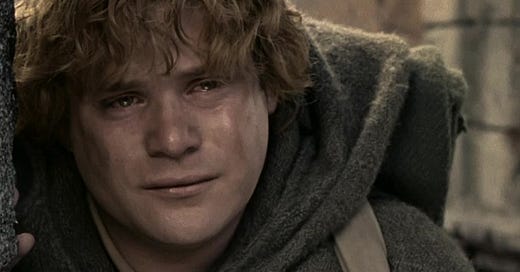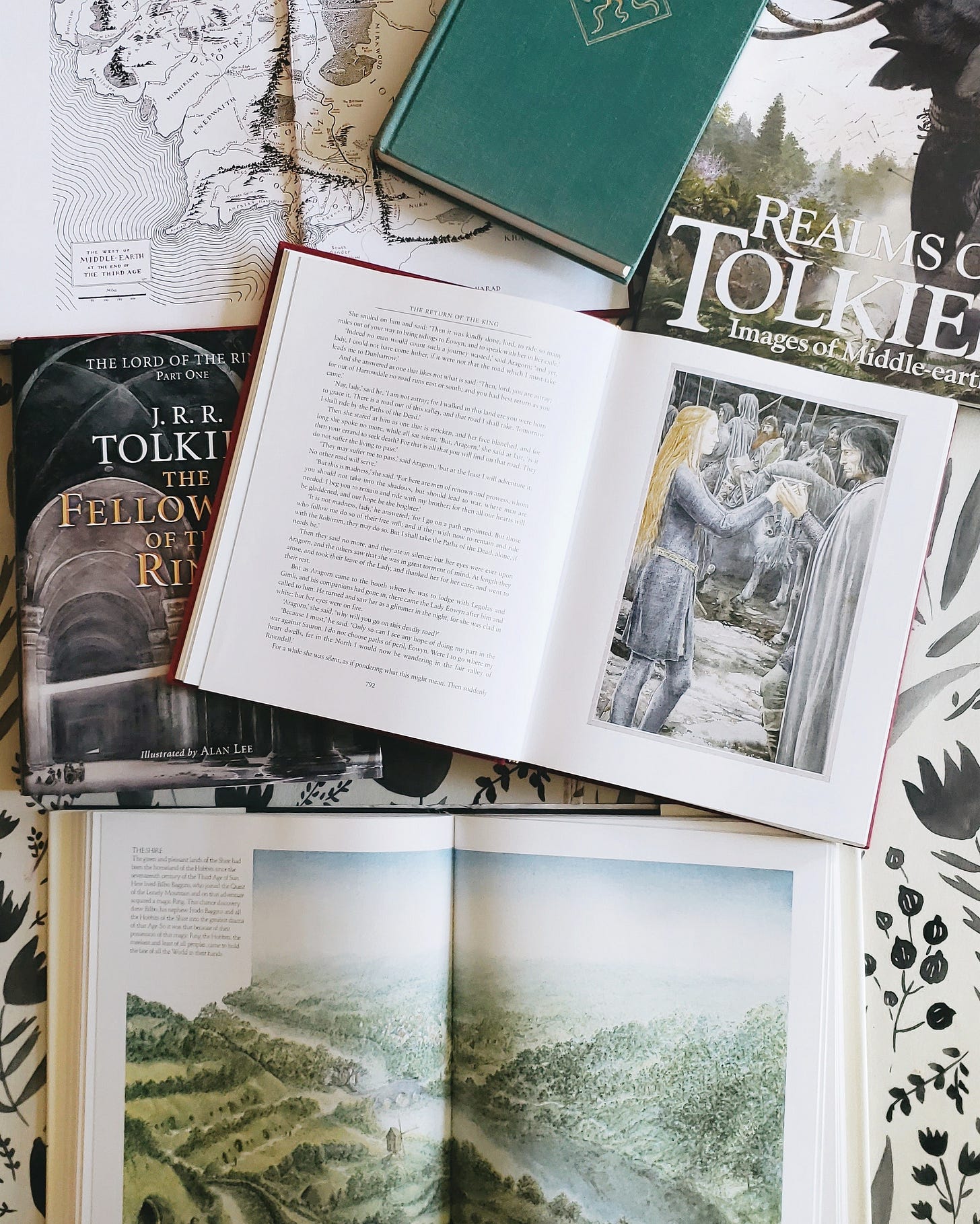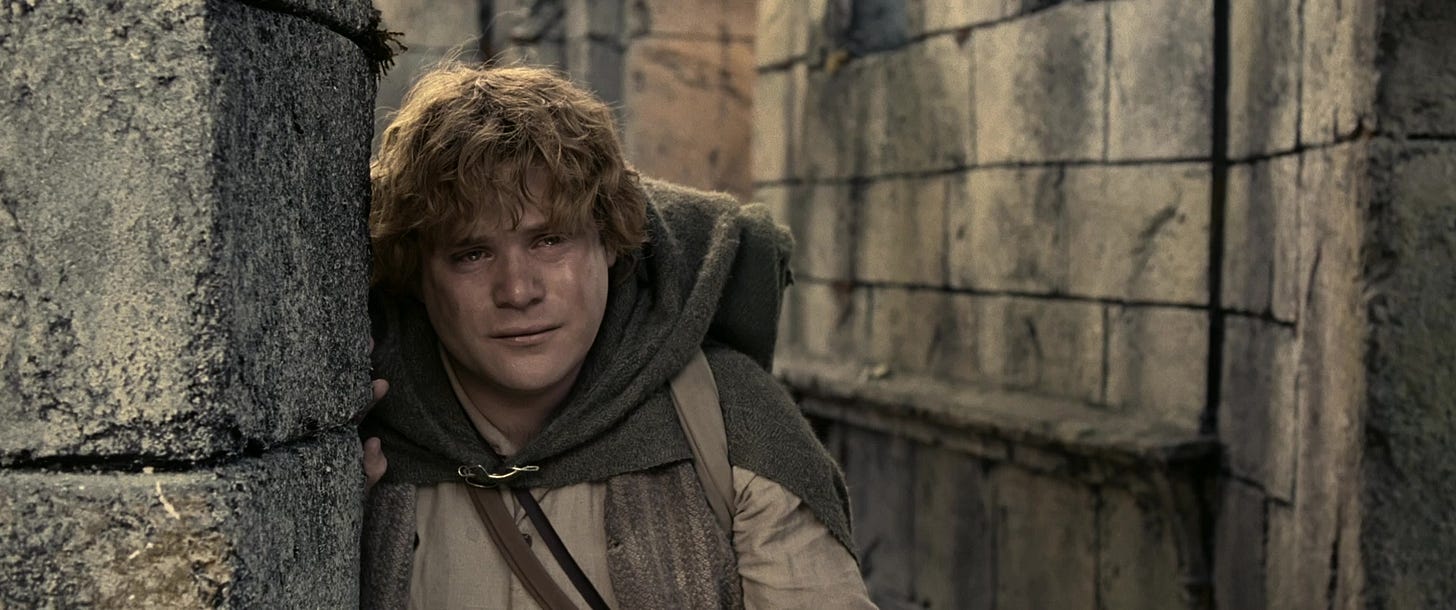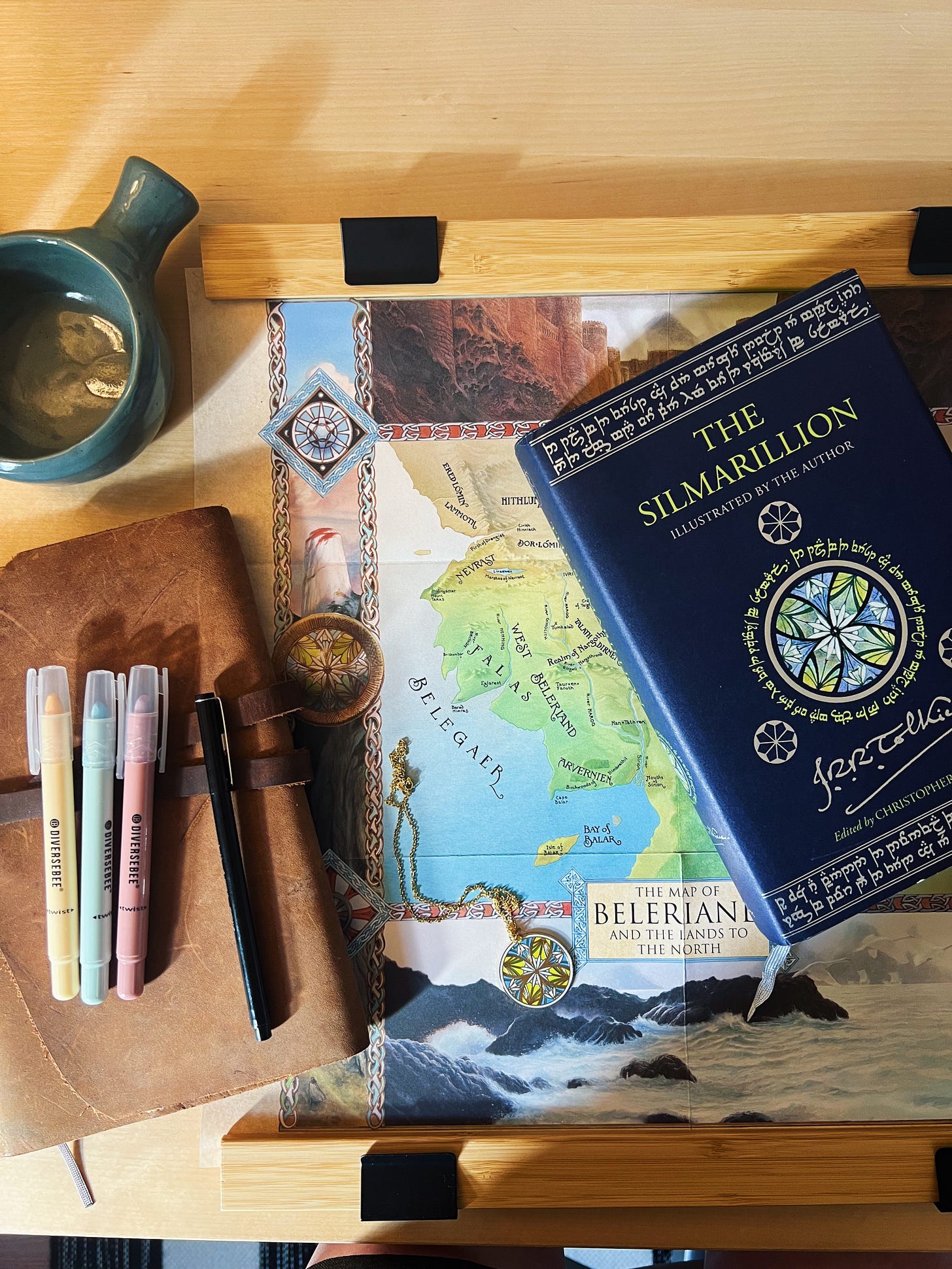We’ve all felt it at some point in our lives: the magic of story. Whether it was being told to us in person, shown to us on a screen, or read by us in a book; we know what it is to feel a story down to our bones. It sticks with us. We carry it or it carries us. We’re not sure which, but we know it matters.
And it seems J.R.R. Tolkien knew this feeling in a deep way. He wrote in his essay, ‘On Fairy-stories:
“It is the mark of a good fairy-story, of the higher or more complete kind, that however wild its events, however fantastic or terrible the adventures, it can give to child or man that hears it, when the 'turn' comes, a catch of the breath, a beat and lifting of the heart, near to (or indeed accompanied by) tears, as keen as that given by any form of literary art, and having a peculiar quality.” - On Fairy-stories, J.R.R. Tolkien
Somehow, escaping into a “fairy-story” offers us reprieve, recovery and the strength to show up in our own real-life stories as we live them out.
Not only did Tolkien believe that reading fairy-stories was a good thing to partake in, he also wove examples of how experiencing them can give us courage into one of his own fictional tales: The Lord of the Rings.
In The Two Towers, we find Frodo and Sam taking the perilous path up the stairs of Cirith Ungol. Physically exhausted, hungry and weary in spirit they stop for a rest. Here, a conversation unfolds between the two Hobbits.
'I don't like anything here at all, said Frodo, step or stone, breath or bone. Earth, air and water all seem accursed. But so our path is laid.’
'Yes, that's so,' said Sam. 'And we shouldn't be here at all, if we'd known more about it before we started. But I suppose it's often that way. The brave things in the old tales and songs, Mr. Frodo: adventures, as I used to call them. I used to think that they were things the wonderful folk of the stories went out and looked for, because they wanted them, because they were exciting and life was a bit dull, a kind of a sport, as you might say. But that's not the way of it with the tales that really mattered1, or the ones that stay in the mind. Folk seem to have been just landed in them, usually - their paths were laid that way, as you put it. But I expect they had lots of chances, like us, of turning back, only they didn't. And if they had, we shouldn't know, because they'd have been forgotten. We hear about those as just went on - and not all to a good end, mind you; at least not to what folk inside a story and not outside it call a good end. You know, coming home, and finding things all right, though not quite the same - like old Mr. Bilbo. But those aren't always the best tales to hear, though they may be the best tales to get landed in! I wonder what sort of a tale we've fallen into?"
'I wonder, said Frodo. 'But I don't know. And that's the way of a real tale. Take any one that you're fond of. You may know, or guess, what kind of a tale it is, happy-ending or sad-ending, but the people in it don't know. And you don't want them to.’
'No, sir, of course not. Beren now, he never thought he was going to get that Silmaril from the Iron Crown in Thangorodrim, and yet he did, and that was a place and a blacker danger than ours. But that's a long tale, of course, and goes on past the happiness and into grief and beyond it - and the Silmaril went on and came to Eärendil. And why, sir, I never thought of that before! We've got - you've got some of the light of it in that star-glass that the Lady gave you! Why, to think of it, we're in the same tale still! It's going on. Don't the great tales never end?'
'No, they never end as tales, said Frodo. 'But the people in them come, and go when their part's ended. Our part will end later - or sooner.'
'And then we can have some rest and some sleep, said Sam. He laughed grimly. 'And I mean just that, Mr. Frodo. I mean plain ordinary rest, and sleep, and waking up to a morning's work in the garden. I'm afraid that's all I'm hoping for all the time. All the big important plans are not for my sort. Still, I wonder if we shall ever be put into songs or tales. We're in one, of course; but I mean: put into words, you know, told by the fireside, or read out of a great big book with red and black letters, years and years afterwards. And people will say: "Let's hear about Frodo and the Ring!" And they'll say: "Yes, that's one of my favourite stories. Frodo was very brave, wasn't he, dad?" "Yes, my boy, the famousest of the hobbits, and that's saying a lot.'"
"It's saying a lot too much,’ said Frodo, and he laughed, a long clear laugh from his heart. Such a sound had not been heard in those places since Sauron came to Middle-earth. To Sam suddenly it seemed as if all the stones were listening and the tall rocks leaning over them. But Frodo did not heed them; he laughed again. 'Why, Sam, he said, to hear you somehow makes me as merry as if the story was already written. But you've left out one of the chief characters: Samwise the stouthearted."I want to hear more about Sam, dad. Why didn't they put in more of his talk, dad? That's what I like, it makes me laugh. And Frodo wouldn't have got far without Sam, would he, dad?'
'Now, Mr. Frodo, said Sam, 'you shouldn't make fun. I was serious.’
'So was I, said Frodo, 'and so I am.’ “
—The Two Towers, Chapter: The Stairs of Cirith Ungol, J.R.R. Tolkien
Here, we see Sam and Frodo using stories to ‘escape’ the prison of their dire circumstances. Sam references the tale of Beren and Lúthien which he heard in full during his time in Rivendell.2 Recalling it makes him feel a bit braver, knowing that he and Frodo are carrying on their part in that same story.
Hearing Sam make these connections causes Frodo laugh, not in mockery, but the kind of laugh that lightens the soul and brightens the heart; the kind of laugh you can only share with a dear friend.
The magic of story.
Who among us has not wondered if we’ll ever be put in ‘songs and tales’? Who among us has not heard or watched or read a great story and found a spark of strength that fueled us to rise to the occasion of our own real-life story unfolding? Stories have a way of doing that for us in the most beautiful ways.
This is why I created this space here on Substack: to guide people through the stories Tolkien wrote; to offer them reprieve and community as we gather around them. Together, we traveled through The Hobbit and The Lord of the Rings (twice) And this spring, I get the opportunity to do it again.
On April 6th (6 days from today!) me and my paid subscribers will be opening up The Silmarillion to journey through it together. This won’t be a formal book club with deadlines and schedules and rigid outlines of each chapter. This will be more akin to our own virtual Hall of Fire where we can come together to read these stories and discuss them together.3
Stories are a gift that can lift our heads to see beyond the dust we have to shuffle through here on earth. Stories give us courage we can tuck in our pockets to hold onto when life is hard. Stories can help us understand that—to paraphrase The Professor—however wild life events get, however fantastic or terrible the adventures, stories given us a turn, a catch of the breath, a beat and lifting of the heart; this is why good stories matter.
Maybe you’re like Samwise and want to hear the story of Beren and Luthien “told in full” or maybe you just need a good story to escape into for awhile; perhaps it’s a bit of both. Either way, you’re welcome to join us.
I’ll meet you there.
This conversation is, of course, what inspired Sam’s famous speech at the end of The Two Towers film.
“In those last days the hobbits sat together in the evening in the Hall of Fire, and there among many tales they heard told in full the lay of Beren and Lúrhien and the winning of the Great Jewel; but in the day, while Merry and Pippin were ous and about, Frodo and Sam were to be found with Bilbo in his own small room. Then Bilbo would read passages from his book (which still seemed very incomplete), or scraps of his verses, or would take notes of Frodo's adventures.” —The Fellowship of the Ring, Chapter: The Ring Goes South, J.R.R. Tolkien







Your post has given me both solace and courage in this time of dread. Thank you.
I wasn't planning on crying this early in the day, but here we are... (good tears!)